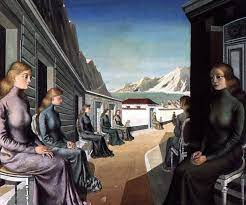
Let’s hear it for poems that end with a question. Reason? Questions are more fun than statements. Questions better reflect life, which is, after all, nothing but a big question mark. Good question makers are much more inspiring to be around and to talk to than big pronouncement types who hit us with their ego-driven blah, blah, blahs like so many blasts of hubris in a growing balloon.
Last time out I discussed a New Yorker poem that gave me pause like so many big-glossy-winning poetic efforts do. You know, the type poem that has you saying, “Really?” to some imaginary editor with an imaginary dream job.
Today, though, I come not to bury Caesar but to praise him (move over Mark Antony). The Sept. 4, 2017, issue serves up a breezy philosophical piece by old friend Stephen Dunn, a poem that ends on a question that, like every good question, leaves you thinking. Have a look, why don’t you:
“The Inheritance”
by Stephen Dunn
You shouldn’t be surprised that the place
you always sought, and now have been given,
carries with it a certain disappointment.
Here you are, finally inside, and not a friend
in sight. The only gaiety that exists
is the gaiety you’ve brought with you,
and how little you had to bring.
The bougainvillea outside your front window,
like the gardener himself, has the look
of something that wants constant praise.
And the exposed wooden beams,
once a main attraction, now feel pretentious,
fit for someone other than you.
But it’s yours now and you suspect
you’ll be known by the paintings you hang,
the books you shelve, and no doubt
you need to speak about the wallpaper
as if it weren’t your fault. Perhaps that’s why
wherever you go these days
vanity has followed you like a clownish dog.
You’re thinking that with a house like this
you should throw a big party and invite
a Nick Carraway and ask him to bring
your dream girl, and would he please also
referee the uncertainties of the night?
You’re thinking that some fictional
characters can be better friends
than real friends can ever be.
For weeks now your dreams have been
offering you their fractured truths.
You don’t know how to inhabit them yet,
and it might cost another fortune to find out.
Why not just try to settle in,
take your place, however undeserved,
among the fortunate? Why not trust
that almost everyone, even in
his own house, is a troubled guest?
Very cool, don’t you think? Especially if you consider your mind a “house” of sorts. We are all troubled guests in our short durations here, and just when we think we’ve stumbled upon the key to happiness, we are disabused of the notion in swift fashion.
Some people, for instance, think the key to happiness is a new start, as in moving away. They quickly discover, however, that you can’t move away from yourself. That “house” we call a mortal coil moves with you.
Money? An inheritance? It is to laugh. In that sense, Dunn’s poem is a cautionary laugh, a troubled, how-did-this-happen laugh.
I don’t know about you, but I like troubled poems, ones with furrowed brows, ones that finish in a questioning tone. It’s as if the poet brings up a problem in life and then hands it off. “Here,” he seems to say, giving it over like a meditation bead, “why don’t you chew this over for a bit.”
And so, we’re left with bougainvilleas and Carraway-less dreams that gently disturb us. Isn’t that what good poetry ending in questions do? Isn’t that one thing we ask of them?









